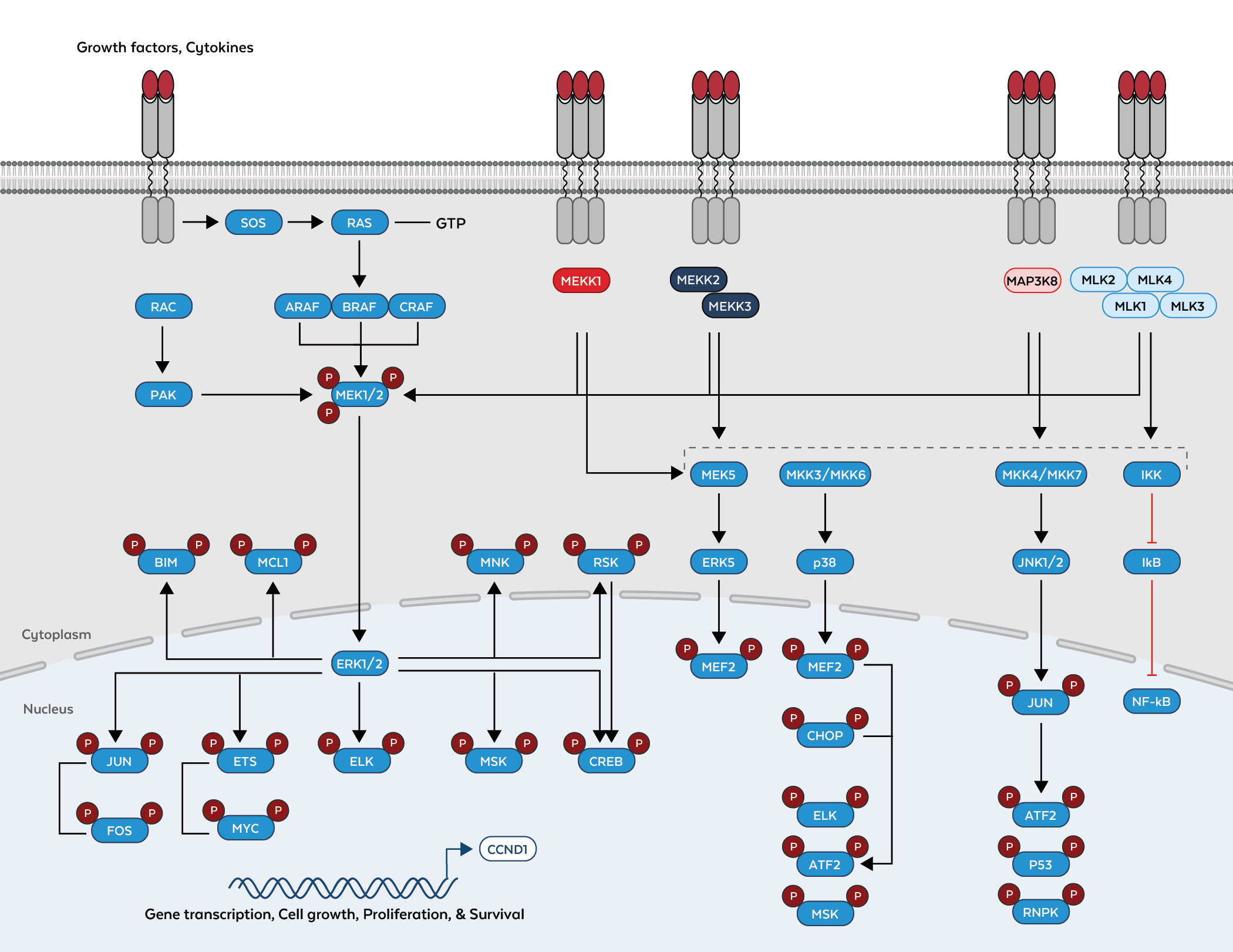MEK-ERK Pathway Antibodies
The Ras-Raf-MEK-ERK Pathway is a critical cell signaling pathway with numerous implications for cancer biology and therapeutic development. Like the AKT-signaling pathway, this signaling cascade is part of the MAPK pathway that plays a role in the regulation of various cellular processes including proliferation, differentiation, development, learning, cell survival, and, under some conditions, also apoptosis. Many of the mechanisms and known but not completely understood. Faulty regulation or function of multiple components in the pathway are observed in cancer cells. In fact, the activity of the Ras-Raf-MEK-ERK cascade is estimated to be increased in about one-third of all human cancers. Both MEK and ERK are phosphorylated by B-Raf in nearly all melanoma cancers.
MEK-ERK Signaling Pathway

Upon activation from upstream extracellular signaling, Raf activates MEK1 and/or MEK2. The Raf and MEK kinase families have limited substrate specificity, but ERK1 and ERK2 enzymes are promiscuous and catalyze the phosphorylation of dozens of cytoplasmic and nuclear substrates including regulatory molecules and transcription factors. MEK1/MEK2 is activated by Raf through the phosphorylation of two serine sites; S218/S222 and S222/S226 respectively. Activated MEK enzymes then upregulate the ERK proteins. ERK1 and ERK2 are protein-serine/threonine kinases that also participate in the Ras-Raf-MEK-ERK signal transduction cascade. MEK1 and MEK2 kinases catalyze the phosphorylation of human ERK1 and ERK2 at 2 distinct activation residues: ERK Tyr204/187 respectively followed by ERK Thr202/185. The phosphorylation of both tyrosine and threonine is required for enzyme activation. Using fit-for-purpose antibodies to aid in the dissection of the specific roles of the MEK and ERK isoforms will allow for a better understanding of the MEK-ERK pathway and potentially new targets for precision medicine.
Suggested Products for Common Assays
For detection of isoform-specific MEK or ERK, use Rockland’s antibodies that have been raised against MEK1, MEK2, ERK1, or ERK2 peptide immunogens. To detect various phosphorylated MEK or ERK isoforms, respective phospho-specific and site-specific antibodies are recommended. Recombinant MEK and ERK proteins are available as controls, and several MEK and ERK protein products are validated in kinase assays.
Selected MEK Antibody Products
| Product | Clonality | Reactivity | Application |
| MEK1 N-Term Antibody | Polyclonal | Human, Mouse, Rat | WB, ELISA |
| MEK1 C-Term Antibody | Polyclonal | Human, Mouse, Rat | WB, IHC, ELISA |
| MEK1 C-Term Antibody | Monoclonal | Human, Mouse, Rat | WB, IP, ELISA |
| MEK1 phosphoS222/MEK2 phosphoS226 Antibody | Monoclonal | Human, Mouse, Rat | WB, ELISA |
| MEK1 phospho T292 Antibody | Polyclonal | Human | WB |
| MEK1 phospho T386 Antibody | Polyclonal | Human, Rat | WB |
| MEK2 N-Term Antibody | Polyclonal | Human, Mouse | WB, IHC, ELISA |
| MEK2 N-Term Antibody | Monoclonal | Human, Mouse, Rat | WB, IP, ELISA |
| MEK2 C-Term Antibody | Polyclonal | Human | WB, IHC, IP, ELISA |
| MEK2 C-Term Antibody | Monoclonal | Human, Mouse, Rat | WB, ELISA |
MEK Related Proteins and Peptide Controls
| Product | Host | Origin | Application |
| MEK1 human recombinant protein | Sf9 Cells | Human | WB, SDS-PAGE |
| MEK1 N-Term Blocking Peptide | ? | Human | WB |
| MEK1 C-Term Blocking Peptide | ? | Human | WB |
| MEK1 double mutant hu recomb protein | ? | Human | WB |
| MEK1 phosphoS218-pS222 hu recomb protein | Sf9 Cells | Human | WB, Kinase Assay |
| MEK2 human recombinant protein | Sf9 Cells | Human | WB |
| MEK2 N-Term Blocking Peptide | ? | Human | WB |
| MEK2 C-Term Blocking Peptide | ? | Human | WB |
| MEK2 double mutant hu recomb protein | Sf9 Cells | Human | WB |
| MEK2 pS222-pS226 hu recomb protein | Sf9 Cells | Human | WB, Kinase Assay |